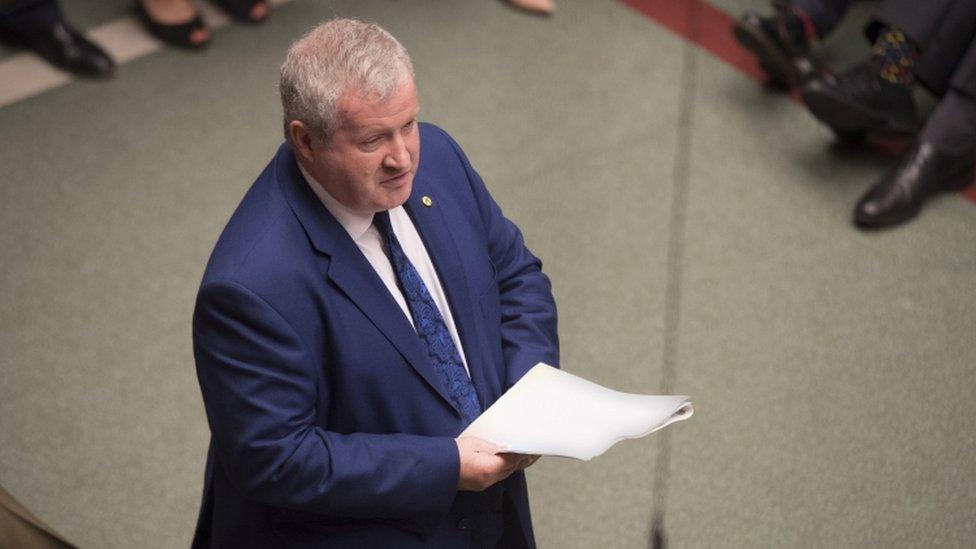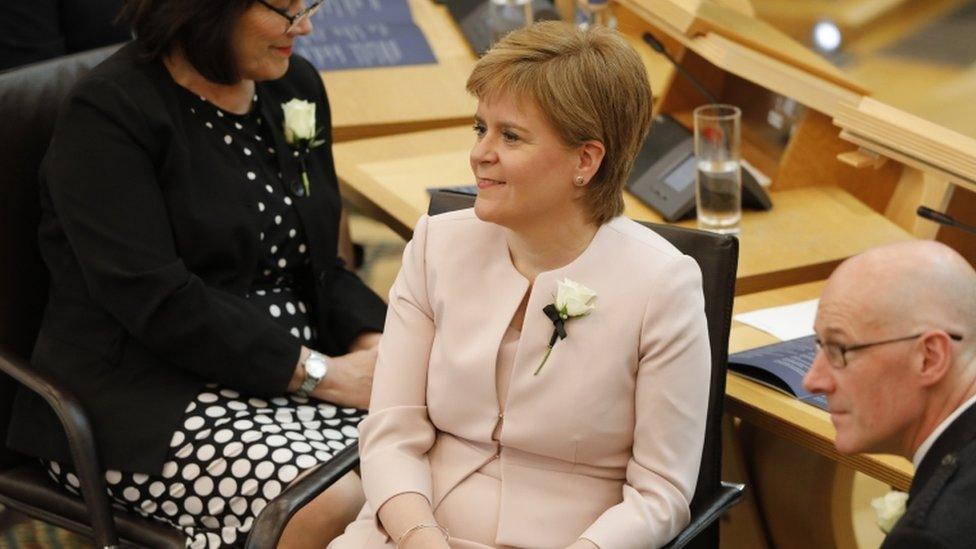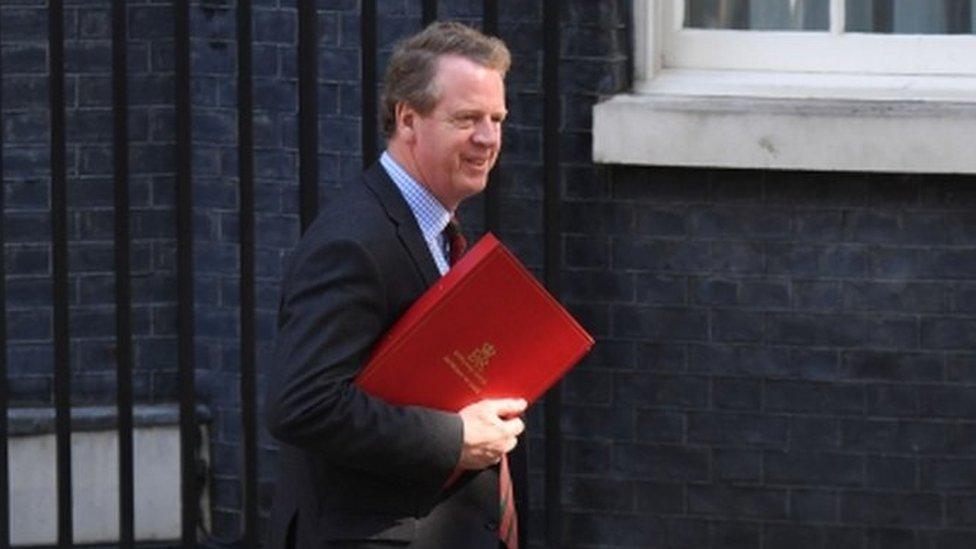Bombastic Boris Johnson is back
- Published
Boris Johnson says Britain would be “clean, green, prosperous, united, confident and ambitious”.
It used to be said of the SNP, by critics and also by pragmatic adherents, that if passion were sufficient then Scotland would be independent by now.
Critics made the point to sound a broadly dismissive note. Internal pragmatists sought to encourage their fellow Nationalists to accept that the sceptical section of the electorate needed explanation as well as exhortation.
But today we can turn this argument around, and address it to the new prime minister, Boris Johnson.
If zeal were enough, if eagerness were sufficient, then the UK would be out of the European Union by now.
Perhaps it was the record July temperature in London, perhaps it was the combative nature of the Commons, amplified by this being the final day before recess.
Whatever the reason, bombastic Boris was back. He raced through his speech and his responses to questions, skipping effortlessly through issues as diverse as satellite communication and the fishing industry (actually, when I think about it, our fishing fleets rely rather substantially upon satellite communication…OK, diversion over).
He flapped his hand frequently in the general direction of the Speaker, like a harbour pilot bringing a vessel into port.

Ian Blackford predicted that Mr Johnson would be the last prime minister of the UK
Eschewing the Opposition, he frequently turned away from the despatch box to address the more amenable environment of the Tory benches (excluding, of course, the legions he sacked).
When he turned back towards the Labour benches, it was to lampoon Jeremy Corbyn, in a rather effective section, as a prisoner of Remain sentiment on his own side.
And the substance? The prime minister repeated his offers of more for policing, the health service and education (with, one presumes, knock-on funding for Scotland, to spend as Holyrood determines).
He repeated his talk of an economic stimulus, again without specifying his thinking on personal income tax. And he spotlighted the prospect of an Australian-style points system for migration.
But, on Brexit, there was little in the way of new detail. There was an "absolute commitment" to leaving on 31 October, with a new drive to prepare for no deal, should that prove necessary.
However, still nothing as to how he would persuade the EU institutions to reopen the withdrawal agreement or to transfer the Northern Ireland elements to the futures document, as he wishes.
And nothing, beyond optimistic projections, as to how a truculent Commons might be persuaded to back a revised deal, should one emerge, still less a no-deal departure.
'Golden age'
But the talk was decidedly ebullient. The rhetoric sub-Churchillian. Britain would be the "greatest place on earth". No community would be left behind. A new golden age dawned.
Perhaps this is, as Mr Johnson would have it, the opening of an entirely new and energetic chapter. Perhaps to question this at all is, as he would have it, merely weary cynicism.
For now, Tories simply have to hope that he knows what he is doing and that zeal and drive will succeed where his predecessor palpably failed.
But the opposition are entitled to oppose. Labour's Jeremy Corbyn said that "arm-waving bluster" was insufficient. Britain needed competence.
For the SNP, Ian Blackford opened rather effectively, welcoming Mr Johnson as the "last prime minister of the United Kingdom".
He questioned Mr Johnson's mandate, particularly in Scotland, and he forecast that the Commons, collectively, would prevent the "madness" of a no deal Brexit.

Ms Sturgeon has repeated her calls for a second independence referendum
That issue was also pursued today by Nicola Sturgeon, in tandem with the first minister of Wales. Both urged Mr Johnson to rule out no deal, Ms Sturgeon adding that Scotland must have an alternative avenue.
One avenue, indyref2, was placed before Mr Johnson by Joanna Cherry of the SNP. The new PM said that the last referendum in 2014 had been described on all sides as a once in a generation choice. He preferred to adhere to that timetable.
Mr Johnson also revisited another challenge to the SNP. Say, he posited, that the UK is out of the EU. Would the SNP then seek to rejoin, to accept the Euro, to enter the Schengen travel area, to rejoin the Common Fisheries Policy?
On the day, it was of course a way of sidestepping questions about his own thinking. And Nationalists would say that they could shape Scottish membership, that there would be no absolute obligation, for example, to adopt the Euro.
But, more generally, this issue of a post Brexit attitude to the EU in Scotland may confront the SNP in the future, depending on events.

Alister Jack attended his first cabinet meeting as Scottish secretary on Thursday morning
And there's more. In this fervid, over-heated atmosphere, another notion has once again floated to the surface.
Might the Scots Tories split from the UK party, in disquiet with PM Johnson? I'm tempted to say: "No, next question."
However, it remains an ever-present prospect. And will no doubt now be discussed again. I would tend to discount it for three reasons.
One, this topic arises every time the UK party is in turmoil, without there being a specific explanation as to how autonomy would work or serve the party's interests in Scotland. Would, for example, Scots Tories still take the party whip in the Commons?
Two, Ruth Davidson is against it - and indeed explicitly won the Scottish leadership election with a platform in direct contradistinction to just such a notion of autonomy.
Three, the party membership in Scotland probably wouldn't fancy it. They are Conservative. They are Unionist.
Remarkable turmoil
Let me close for now with a word about successive Secretaries of State. Commiseration to David Mundell who leaves the Scotland Office after nearly a decade, in sundry ministerial roles.
He stuck to his last through periods of quite remarkable turmoil in politics, including a spell as the only Scottish Tory in the Commons. He coped with challenges ranging from the devolution structure to the consequences of Brexit.
At all points, he remained courteous, focused and, mostly, good-humoured. For that endeavour alone, he merits praise.
I can readily understand those who seek to criticise him for waiting to be ousted, rather than resigning in principle. Equally, there is the alternative argument that it is generally more effective to seek to pursue the causes one champions from inside the tent, rather than on the ropey side of the canvass.
And congratulations then to Alister Jack, the incoming Secretary of State. He too will face a tough challenge, not least accommodating the new Minister for the Union (blond, unkempt hair? Classics scholar? Journalist? Just became PM? Yep, that's the one).
Mr Jack is perhaps not particularly well known, having been an MP for a short period. But he is well respected as a quiet Tory tactician and strategist over a period of several decades.
His background is in business and agriculture. But his absorption in Scottish politics is total. He has a reputation for blending politeness with toughness.
Again in a quiet fashion, he carved a role for himself in the Tory Whips' Office. Never an easy task and particularly difficult in these Brexit times.
By all accounts, he performed that task well, self-evidently attracting the attention of the PM. He now faces the challenge of translating that, inevitably, private role into the very public office he has been given.
